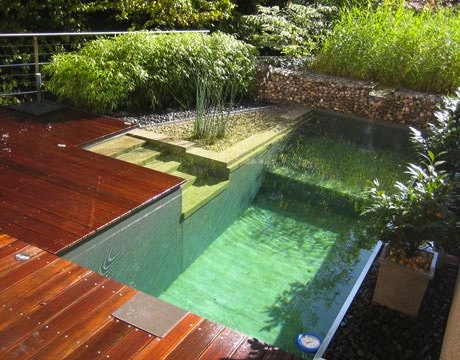Green Swimming Pools, Part Two
In part one of this article, we looked at some of the reasons traditional swimming pools are considered to not be very environmentally-friendly. Excessive water usage and the reliance on fossil fuels and toxic chemicals are all drawbacks to the swimming pool, but the positive qualities a pool adds to our lives can still make them attractive to a 'green' homeowner.
In this section, we'll take a look at some ways to lessen, even eliminate, the environmental impacts of swimming pools, while still keeping them clean, warm, and safe.
Water Savings
Pools need water; there's no way around that obvious fact. Pools can require thousands of gallons of water, but there are easy ways to reduce water loss.- Keep it cool: The hotter the pool water, the more of it will evaporate. Turning down the heat by a few degrees cuts down on evaporation, and still provides a comfortable swim.
- Invest in a pool cover: An uncovered pool can lose an amazing amount of water to evaporation both during the hot day and cooler night. A pool cover on the water when the pool's not in use cuts evaporation by 50% or more; it will also help heat the water naturally, as you'll see later.
- Windbreak: Wind blowing over the surface of a pool carries water away. A windbreak consisting of natural trees or bushes or a high fence conserves water, and gives you privacy as well.
- Check for Leaks: Water leaking from the plumbing of a pool can waste tens of thousands of gallons a year.
- Keep Filters clean: Keeping pool filters clean reduces the need to backwash, which wastes water. When you do need to backwash, direct water onto your lawn or other natural areas, not down the drain.
- Settle down, kids!: This may be impossible, but curtailing diving, splashing, and other horseplay saves water. Any time water gets splashed up into the air, some of it will evaporate or spill over the edge of the pool. Let the kids have fun, but know that telling them to knock it off once in a while will save some water.
Energy Savings
Keeping a pool heated can result in huge energy bills, especially in cooler areas. Pool heating can cost hundreds of dollars over the course of the swim season and burning fossil fuels leads to significant climate-change emissions. But heating a pool doesn't necessarily require a gas or electric heater.- Pool Cover: Investing in a quality pool cover will help heat your pool. At night, the cover will keep the waters' heat from escaping like a blanket on a bed. During the hot sun of the day, covering an unused pool will take the sun's energy and transfer it into the water. Here in Michigan, the gas heater on my Dad's pool broke down 20 years ago, and he's been heating the pool exclusively with a solar pool cover ever since. A few hot days easily heated his 10,000 gallon pool into the comfortable 80-degree range. Pool covers work!
- Solar Water Heating: Pool owners in southern states with year-round pool use have been using solar water heating for a long time; advancements in technology have made solar heating a viable heating option for pool owners everywhere. Please see our detailed solar water heating article here.
Reducing Pool Chemicals
Many people are looking to reduce or eliminate the use of toxic chemicals such as chlorine to keep their pool water clean and safe. Exposure to these chemicals is associated with respiratory ailments, and accidental ingestion or inhalation of concentrated chemicals can be fatal; green homeowners looking for more natural alternatives have a couple of options available. We'll look at each in their own detailed articles:-Salt Water pools: Pools using salt water chlorination are considered to be safer; they use dissolved salt as a store for the chlorination system. The pool's chlorinator uses electrolysis to break down the salt, which produces hypochlorous acid and sodium hypochlorite. These are the compounds that sanitize the water much like traditional chlorine. This process eliminates chloramines, which are the irritants in traditional pools that cause chemical irritations. For more information on salt-water pools, see our article here.
- 'Natural' Pools: Natural pools use no chemicals at all, and no salt. The water is purified by mimicking Mother Nature, using plants, beneficial bacteria, and microbes. For more information on natural pools, click here.
To read part one of this article, click here
comments powered by Disqus



































































